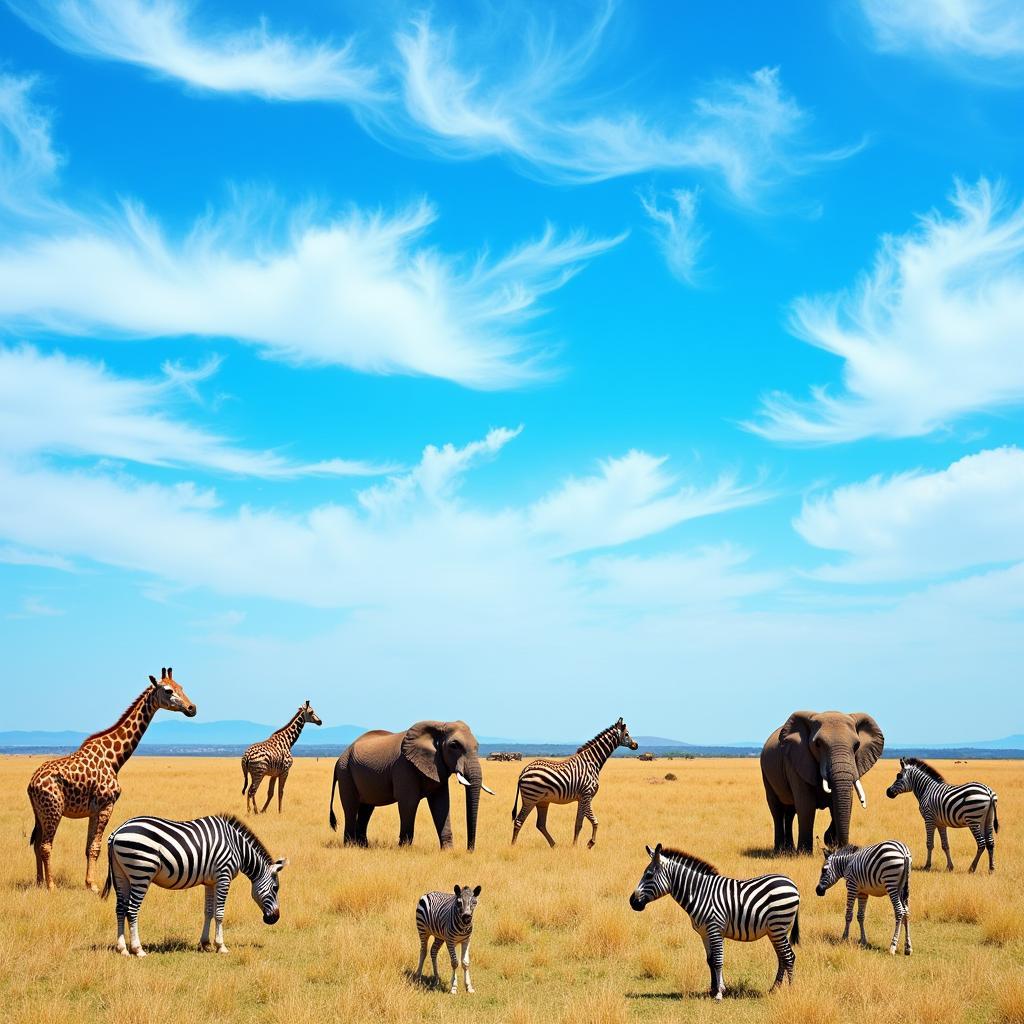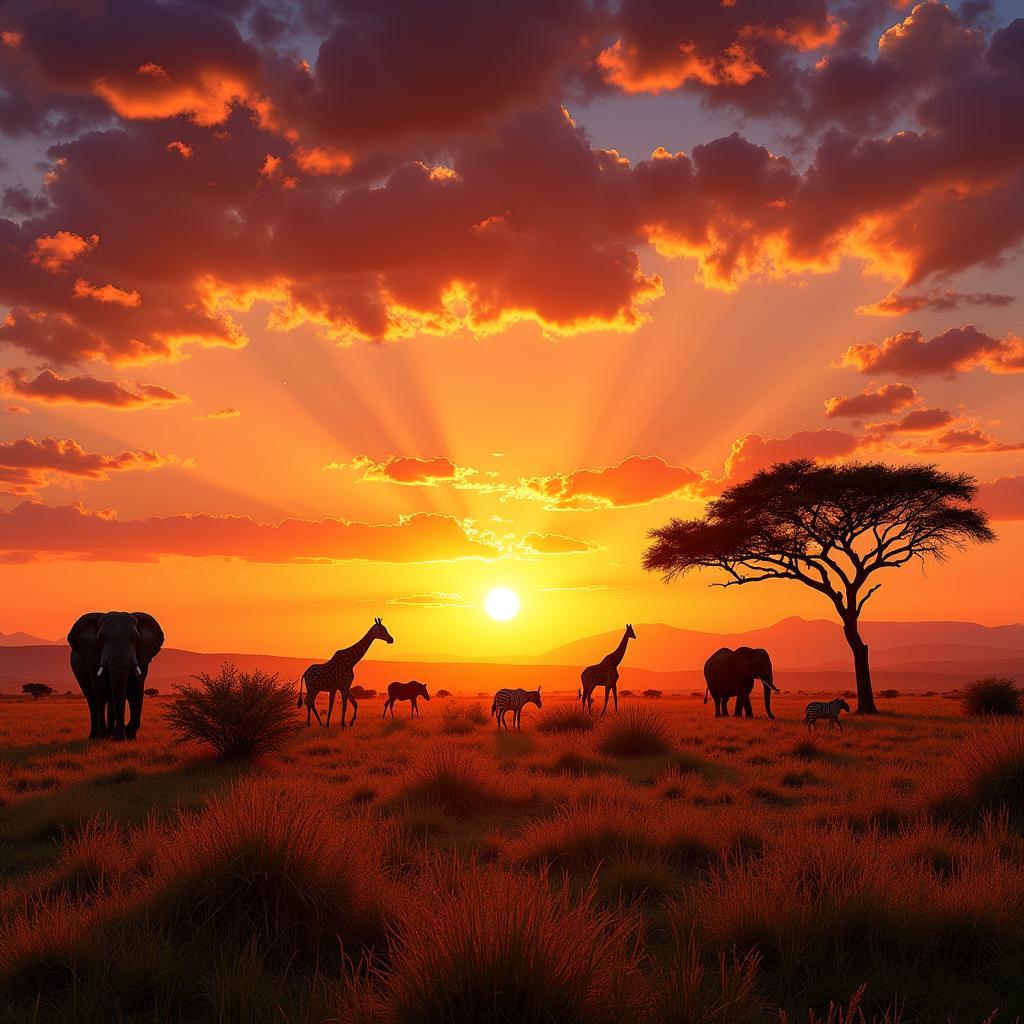Unveiling the Stories Behind African Flags Facts
African Flags Facts offer a fascinating glimpse into the continent’s rich history, diverse cultures, and aspirations for the future. From vibrant colors to symbolic emblems, each flag tells a unique story, reflecting the struggles, triumphs, and identities of the nations they represent. Understanding these stories is key to appreciating the complexity and beauty of Africa.
A Kaleidoscope of Colors and Symbols: Exploring African Flags Facts
African flags facts are much more than just identifying colors and patterns; they reveal the heart and soul of a nation. Each element, carefully chosen and imbued with meaning, tells a tale of resilience, unity, and hope. Whether it’s the Pan-African colors of red, yellow, and green, or the unique symbols specific to each country, exploring these details unlocks a deeper understanding of Africa’s diverse heritage. Did you know that some flags feature animals representing strength and courage, while others incorporate natural elements like stars and suns symbolizing guidance and prosperity?
Many African flags use colors inspired by the Ethiopian flag, one of the oldest independent nations in Africa. The colors green, yellow, and red have become associated with Pan-Africanism, a movement advocating for the solidarity and liberation of African people. These colors often symbolize natural wealth, hope, and the blood shed for independence respectively. Other colors like blue, white and black also hold significance, representing water resources, peace, and the African people.
Let’s take a closer look at some fascinating facts surrounding these emblems of national pride. For example, the South African flag, adopted in 1994, is a powerful symbol of unity and reconciliation, marking the end of apartheid. Its “Y” shape represents the convergence of different cultures and ethnicities into a single nation.
The flag of Ghana, with its prominent black star, holds a powerful message of freedom and independence. It was the first flag in sub-Saharan Africa to incorporate the Pan-African colors, and the black star became a symbol of hope for other African nations striving for liberation.
African Country Flag and Names: A Quick Guide
Understanding which flag belongs to which country is essential for anyone interested in African geography and culture. If you’re looking for a resource that lists all African country flag and names, you’ll find several helpful websites and books that provide comprehensive guides. These resources often include details about the meaning and history behind each flag, enriching your understanding of the continent’s diverse nations.
Delving into the Symbolism: What do African Flags Represent?
What stories do these flags tell? They narrate tales of independence, resilience, and cultural pride. For example, the African cojntry with black flag demonstrates a powerful statement. While black is often associated with mourning in Western cultures, in many African contexts it represents the people, resilience, and pride in their heritage.
Many flags incorporate symbols related to their natural resources, such as animals, trees, or minerals, reflecting the importance of these resources to their economies and cultural identity. Other flags feature geometric patterns and shapes that hold deep cultural meaning, often representing traditional beliefs and values.
Learning about these symbols is like unlocking a secret code, allowing you to delve deeper into the rich tapestry of African heritage. Did you know that some flags even feature weapons, symbolizing the struggles for independence and the determination to defend their sovereignty?
Beyond the Surface: The Impact of History on African Flags
The design of many African flags is deeply rooted in the continent’s complex history. The influence of colonialism, the fight for independence, and the rise of Pan-Africanism have all left their mark on the flags we see today. Understanding this historical context provides a richer appreciation for the meaning and symbolism behind each flag.
For instance, some flags intentionally depart from colonial imagery, embracing traditional African symbols and colors to assert their reclaimed identity. Others retain elements from colonial flags, but recontextualize them to reflect a new era of independence and self-determination. These historical narratives add another layer of depth to the study of African flags facts. If you are interested in learning about supporting those less fortunate, you might also be interested in resources about African kids in need.
Conclusion: A Continent’s Story Told Through Flags
African flags facts provide a compelling window into the continent’s diverse cultures, histories, and aspirations. From the Pan-African colors to the unique symbols specific to each nation, each flag tells a powerful story. By understanding these stories, we gain a deeper appreciation for the rich tapestry of African heritage. So, the next time you see an African flag, take a moment to consider the stories it holds, the struggles it represents, and the hopes it embodies. Exploring African flags facts is a journey into the heart of a continent, revealing its vibrant past, present, and future.
FAQ
- What are the Pan-African colors?
- Why do so many African flags use similar colors?
- What is the significance of the black star on the Ghanaian flag?
- How do African flags reflect the history of colonialism?
- What are some unique symbols found on African flags?
- Where can I find African country flags coloring pages?
- What does the “Y” shape on the South African flag represent?
Further Exploration
Consider exploring the symbolism of individual African flags in more detail. You can also research the history of flag design in Africa and the influence of different cultural and political movements. Perhaps you’re interested in finding out more about the topic of African free porn tube?
Need Assistance?
When in need of assistance, please feel free to contact us by Phone: +255768904061, Email: [email protected] Or visit us at: Mbarali DC Mawindi, Kangaga, Tanzania. Our customer service team is available 24/7.

